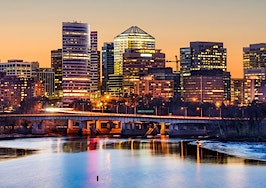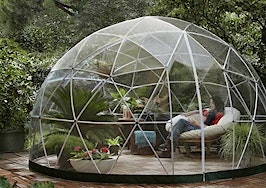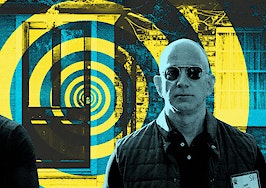When Amazon announced late last year that it would build a major “HQ2” office in Crystal City, Virginia, agents’ phones began ringing off the hook and a frenzy of real estate activity ensued.
But now less than nine months later, a new reality has set in: The market for both buyers and agents in the area is actually pretty tough.

Mark Lawter
The trouble stems from extremely low inventory, according to multiple real estate professionals in the area. Mark Lawter, a Keller Williams agent in the region, told Inman Tuesday that in his area the number of closed sales was down 8 percent in June compared to one year prior, while the number of listings fell more than 20 percent.
And of course the consequence of fewer listings is that buyers who are still looking have to be much more aggressive.
“You’re having to escalate 5, 10 percent over the asking price just to be competitive to win the offer,” Lawter said. “A lot of younger people don’t have the cash. It can be frustrating for first-time home buyers for sure.”
Lawter said that he is still very busy, and that things are great if you happen to be a seller. Obviously, he and others also knew that there would be a rush to the market following Amazon’s announcement, and price increases have already been well-documented.
Still, conditions have proven to be even rougher for buyers, and for total sales numbers, than Lawter anticipated.
“No one expected this amount of inventory,” he added. “That’s in direct correlation with Amazon. It’s really fueling the market.”
Numbers from ATTOM Data Solutions, which were provided to Inman, bear this out. The data shows that in May 2019, the 22202 zip code — which includes Amazon’s Crystal City location — saw a 59 percent year-over-year drop in the number of single family and condo sales. Compared to two years ago, May 2019 saw a 61 percent drop in total number of sales.

ATTOM Data Solutions and Jim Dalrymple II
The broader Arlington County area saw a 53 percent drop in sales in May compared to both 2018 and 2017.
Meanwhile ATTOM’s data shows that nationally, the U.S. only saw a 9 percent year-over-year drop in sales in May.
An ATTOM spokesperson noted that some sales data is still trickling in for the last few months, so these numbers could change. However, assuming the trend more or less holds, the overall pattern is clear: Home sales near Amazon’s HQ2 have fallen off a cliff compared to the relatively modest declines the country as a whole has seen.
The data also shows that prices in May increased 6 percent year-over-year nationally, but 17 percent in the 22202 zip code. Thanks to the relationship of supply and demand, prices tend to go up when inventory is low, so the spike in 22202 further cements the idea that there’s a low inventory of on-the-market homes there.
Data from Zillow, also provided to Inman, further shows this trend continuing, with the median list price in June of this year up 34 percent compared to June 2018.
Finally, data from Bright MLS — the multiple listing service that covers the region — also shows a steep drop off in listings as well as an increase in prices.

Credit: Bright MLS
Responding to these conditions, Northern Virginia news website InsideNoVa described the 22202 zip code Tuesday as the “epicenter” of Amazon’s impact on local real estate.
Some Amazon critics will likely feel vindicated by the current conditions in Crystal City and its surrounding environs. In addition to Virginia, Amazon’s initial HQ2 announcement — which followed a highly publicized selection process — also included plans to build in New York City’s Queens borough. However, a vocal contingent of New Yorkers and New York lawmakers immediately began pushing back.
That group eventually convinced Amazon to abandon its plans for the Big Apple.
Critics during that process made a number of complaints about Amazon, one of the most prominent of which was that a sudden influx of high-paid tech workers could lead to runaway gentrification and housing cost inflation.
Those workers are mostly yet to arrive in Crystal City, but current conditions there nevertheless suggest preliminarily that concerns about price spikes and inventory shortages were well-founded.

Rob Carney
Echoing Lawter’s observations about first-time buyers, Rob Carney — managing broker TTR Sotheby’s International Realty’s Arlington office — told Inman that these conditions are particularly affecting people at the lower end of the price spectrum. He said the median home price in the area is about $800,000 and that demand has been particularly strong for properties priced under $1.2 million. Homes in the Arlington area that fall in this range tend to be “nice,” Carney added, but not palatial or extravagant.
Part of the problem is that many existing homeowners are apparently just holding onto their properties and waiting until Amazon’s plans have actually been implemented, Carney said. Immediately following Amazon’s announcement, the area also saw a rapid influx of investors.
These factors have combined to make it difficult for people who already live in the area to move up the ladder into bigger homes.
“The move-up buyer is being limited in this low inventory environment,” Carney said. “Agents are experiencing some frustration.”
For now, all eyes are on Amazon and how the company’s plans play out. Though Amazon itself didn’t immediately respond to Inman’s request for comment Tuesday, Carney said that he has begun to see job listings — meaning that the workers are at least on their way.
However, while no one expects the Crystal City area to go back to the way it once was, Lawter did say that conditions in the near future could be, at the very least, a little bit better.
“Next spring won’t be as crazy,” he speculated. “But it’s just going to be all driven by the inventory level.”
Update: This post was updated after publication with addition data and information about the market in the Crystal City area.






